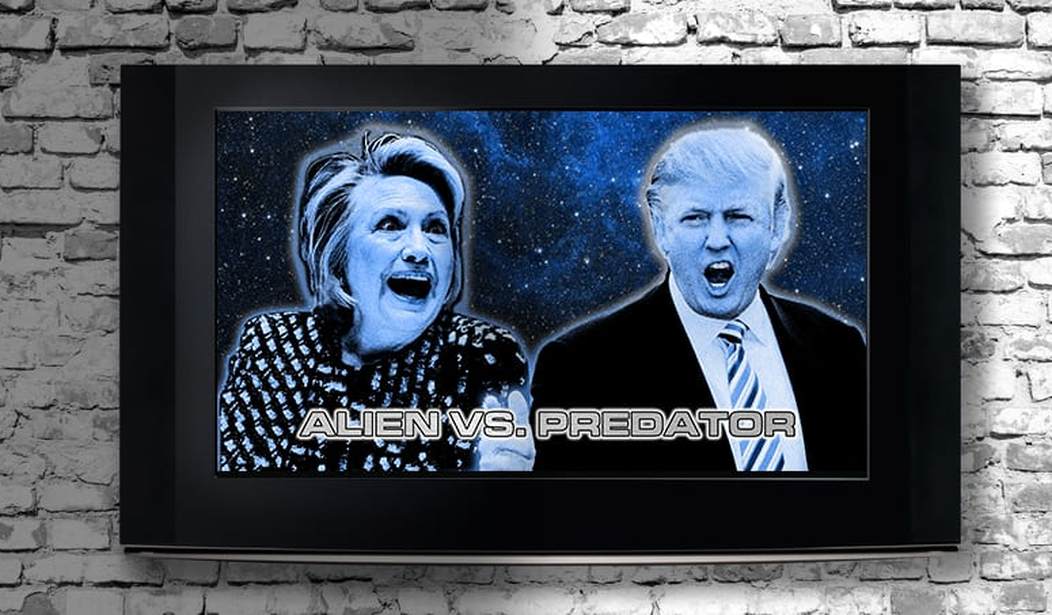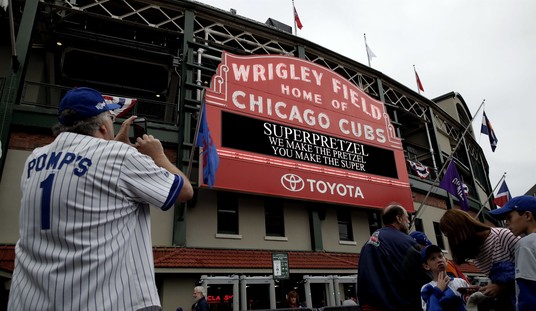We should always be on guard against presentism, but in this instance I do not hesitate to say that the upcoming presidential election is the most alarming in American history. I can make that statement with confidence because I do not believe the most disturbing aspect of the election is the choice of candidates – even though the two major party nominees present the worst choice the American people have faced in my lifetime (Eisenhower was president when I was born), and perhaps ever.
The reason this is such a frightening election is that the Constitution’s mechanisms for reining in or ousting a rogue president are in tatters.
We are not supposed to have transformative elections, contests that will forever change our system of government or enable government to orchestrate cultural upheaval. The Constitution is supposed to be our guarantee against that.
A couple of years ago, I wrote a book called Faithless Execution in an attempt to explain this and campaign, in my own small way, for a restoration. The theory I posited was straightforward. Among the greatest fears of those who founded our constitutional republic was that the powerful new office they were creating, the President of the United States, could be a path to authoritarianism and eventual tyranny. Much of the deliberation over the drafting and adoption of the new Constitution was dedicated to ensuring adequate safeguards against that possibility.
The Constitution’s aim is to preserve liberty and self-determination. Its prescription for doing so is to constrain government (and thus increase the realm of free, unregulated activity) by limiting and dividing governmental powers. Federal authority was balanced by states that maintained sovereign power. The limited powers delegated to the federal government were divided among three branches, each given sufficient inherent authority that it could not be overwhelmed by the others.
To prevent the president from becoming a monarch, the Framers made Congress supreme over the budget and the enactment of law. With limited inherent authority (albeit significant authority, particularly in the conduct of foreign affairs), the executive would not be permitted to act in the absence of statutory license and funding. Indeed, the president’s primary responsibility is to take care that Congress’s laws are faithfully executed and the Constitution is preserved.
Yet, realizing these grants of legislative power would be insufficient to hem in a determined rogue, the Framers added impeachment – an “indispensable” remedy, as Madison put it. It empowers Congress to remove government officials, up to and including the president, for “high crimes and misdemeanors” – corruption, abuse of power, misleading Congress, collusion with foreign powers against American interests, and other profound violations of the public trust.
Thus, besides the ballot box, the most vital limitations on presidential power are Congress’s powers to control spending and impeach. These were thought sufficiently strong checks that, for over 160 years, the president was not even term-limited (i.e., until the 22nd Amendment in 1951). This confidence owed to the principle that members of Congress had a solemn duty to defend their institutional authority and the constitutional framework. In essence, the president can act as a rogue only if Congress allows that to happen.
As I argued in Faithless Execution, while Congress’s powers to thwart abuse of presidential power are dispositive, there are, really, only two of them. If Congress refuses to use its authority to limit or cut off funding, the only remaining limitation is impeachment. If, in addition, Congress takes impeachment off the table, there is nothing left but a rogue president’s subjective sense of what he (or she) can get away with politically. The same, obviously, is true of the president’s subordinates: If, despite their lawlessness or incompetence, Congress maintains (or increases) their budgets and shrinks from impeaching them, then they are limited only by the whims of the rogue president they serve.
This is why our system no longer works. The Congress is AWOL: an increasingly irrelevant institution that: (a) does not see itself (either individually or collectively) as obliged to defend the Constitution; (b) delegates its legislative tasks to the sprawling bureaucracy, over which the president has far more influence; (c) punts tough calls to the judiciary, simultaneously refusing to exploit its constitutional authority over the courts’ jurisdiction in order to prevent or reverse judicial imperialism; and (d) is incompetent to perform basic tasks, such as imposing “regular order” on the appropriations process and compelling presidents to submit international agreements to the Constitution’s treaty process.
The power of the purse is now a toothless check. In the last century, the federal government’s most basic role has been transitioned from national security to social welfare, wealth redistribution, and economic regulation (including transfer payments to industries and research institutions based on political favoritism, not market forces). Congress is paralyzed by fear that any cutting off of funds will be portrayed as a denial of someone’s entitlement or other transfer payments.
Furthermore, with the appropriations process having collapsed, the government operates under huge “omnibus” spending acts and “continuing resolutions.” This transforms budget battles into ludicrously high-stakes affairs, in which attempts to force government to live within its means – means that are far greater than they have ever been – become shutdown showdowns. This itself is an extension of another dysfunction: Congress no longer reads the laws it writes, or even perceives that dereliction as a dereliction. Single $4 trillion budget resolutions of hundreds of inscrutable pages that no one could conceivably read are now standard fare. Lots of critical legislation is now that way.
If it is possible, Congress is even less disposed to flex its atrophied impeachment muscles than to use its power over the executive branch’s funding. It resorts, instead, to such pusillanimous stunts as filing lawsuits against the executive branch. Lawmakers hope no one will notice that the Constitution vests Congress with more than enough power to do its own heavy lifting, while the courts have no power to enforce their writs without the cooperation from the executive branch – which is, shall we say, less than cooperative when it comes to corralling itself.
Despite all this, GOP sympathizers claim that the Republican-controlled Congress has effectively countered President Obama. They brush aside critics as wild-eyed naifs who do not grasp that the president has veto power and that the legislature in our system cannot govern unilaterally.
To be sure, the United States is not the center-right country it was a generation ago. The nation has twice elected a man of the transnational, post-American left – more narrowly the second time than the first. The explanation of how this has happened, which itself involves a significant amount of abdication by conservatives and constitutionalists, is a topic unto itself. For present purposes, the point is that the country has shifted to the center-left politically. It was to be expected that this shift would be reflected in policy. No reasonable person believed Obama would be stopped cold.
Obama and Democrats completely controlled the political branches in the president’s first two years in office – enacting such monstrosities as Obamacare, Dodd-Frank, and the stimulus. No reasonable person believed Republican control of Congress in the ensuing years would reverse and roll back Obama’s agenda. Still, while Congress needs the president to repeal prior legislation, the president needs the Congress to provide funding for current and prospective spending. Not a dime can be spent without congressional approval.
Since the start of the Bush 43 administration, the federal deficit has exploded from about $5 trillion to about $20 trillion (doubled under Bush, then that inflated amount doubled again under Obama). During the majority of those 16 years, Republicans controlled one or both houses of Congress.
In each election cycle, Republicans campaign by promising to curtail metastasizing government. Here, for example, is Senate GOP leader Mitch McConnell during the 2014 campaign, talking about how the power of the purse would be used if voters gave Republicans control of both houses of Congress:
That means we can pass the spending bill. And I assure you that in the spending bill, we will be pushing back against this bureaucracy by doing what’s called placing riders in the bill. No money can be spent to do this or to do that. We’re going to go after them on health care, on financial services, on the Environmental Protection Agency, across the board. All across the federal government, we’re going to go after it.
But then they win … and they agree to pay for everything they campaigned against – Obamacare, immigration lawlessness, a Justice Department that practices racial discrimination in law-enforcement while using extortionate lawsuits to federalize the nation’s police, an IRS used as a weapon against conservative activists, an EPA decreeing economy-strangling regulations Congress has refused to enact, and so on. Moreover, they pass sleight-of-hand legislation to duck confrontations with Obama on the debt ceiling and the Iran deal – pieces of theater designed to dismantle the Constitution’s brakes but to allow them to pose as opposing that which their legislation actually enables.
To illustrate the emptiness of arguments by apologists for the Republican Congress, one need only ask what would happen if the roles were reversed. What if a Republican president tried to rein in entitlement spending? What if he unilaterally announced that, in an exercise of “prosecutorial discretion,” tax evasion laws would not be enforced to collect corporate taxes above ten percent of income? What if his IRS targeted progressive activists and his Justice Department stonewalled congressional investigations – including one involving a case in which an inane law-enforcement tactic (e.g., gun-walking) got a federal agent killed?
We needn’t tarry long on this. A Democratic Congress would throw down the gauntlet and risk a government shutdown in order to force the president to back down. A Democratic Congress would not hesitate to impeach the IRS commissioner and the attorney general; and it would relish impeaching the president himself – calculating that even if Democrats lost, they would leave the president battered and impotent.
Democrats do not tell their supporters, “The president has veto power and Republicans have the numbers to block us, so don’t expect us to accomplish anything.” Democrats know you move public opinion by fighting, even if you lose battles along the way. A movement has to move. And since they and the mainstream media are part of the same movement, they do not doubt their ability ultimately to turn public opinion in their favor.
Equally important, though, Democrats and the media care more about the advancement of their cause than Republicans care about preserving the Constitution. Democrats used every trick in the book to enact Obamacare, knowing it was immensely unpopular and would become even more unpopular as it gradually failed. They were willing to sacrifice themselves to short-term political damage in order to secure the long-term achievement of government-controlled healthcare. They understood that once Obamacare was on the books, the trajectory toward a single-payer system would be in place, and Republicans – for all their saber-rattling – would not defund it. Any future “fixes” would occur under Obamacare’s assumptions about the government’s preeminent regulatory role. The left is willing to take its hits on something so crucial to its cause.
So we have one faction in the country that is willing to use the Constitution’s powers; but that faction also happily undermines the Constitution whenever it proves an obstacle. That faction’s vision is post-constitutional.
That is why the 2016 election is so harrowing. It is not just that the candidates are awful yet one of them will become president. It is that our political class has eviscerated the constitutional weapons that protect us from an awful president. Thus, what the Framers most feared is coming to pass.








Join the conversation as a VIP Member